Phone Horror (5)
By:
June 17, 2014
[Fifth in a series of 10 posts on representations of the telephone as instrument of fear, conduit of spirits, and messenger of madness. Parts 1-4 were adapted from posts published at the blog The Face at the Window in 2005-06; parts 5-10 appear here for the first time.]
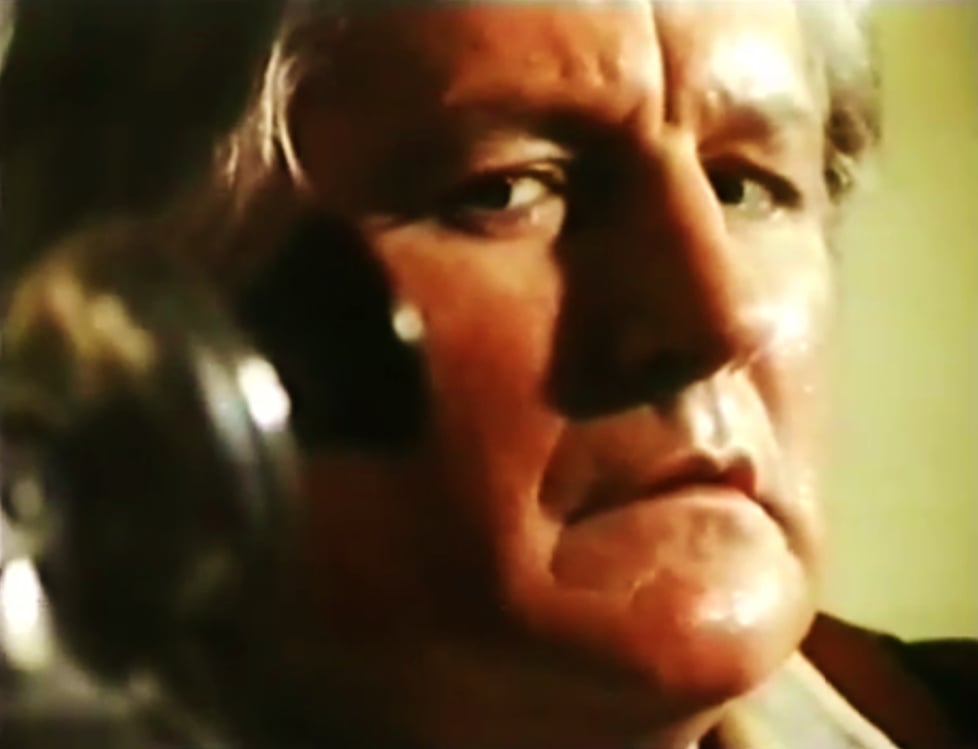
A Child’s Voice
David Thomson, one of the most interesting writers in the world, is acclaimed as a film critic and historian, though he has also written books on English football, Arctic exploration, Las Vegas, and Laurence Sterne. He’s lived in America for some 40 years. But he’s an Englishman born in 1941, and that means he grew up listening to the BBC, the centralized news-and-entertainment provider of his native country, a monopolistic entity without any real counterpart in America.
Goes around, comes around: Thomson’s sole teleplay, the half-hour A Child’s Voice, was written for the BBC and telecast in 1978, and is predicated on two electronic gadgets invented to transmit the human voice — the radio and the telephone.
Opening images are of a looming radio and, in deco cartoon, a husband and wife taking in a broadcast by firelight. A narrator speaks in voice-over:
In those days, radio was a power and a light in the land. People in their homes at night gathered by the radio and heard the crackling, stilted reports of a world they had only read about — and now, imagined more intensely.
Radio fixes the person, but frees the imagination. And the people most affected by it were those who lived and listened alone.
We are introduced to Ainsley Rupert Macreadie (T.P. McKenna), known as “the disturbing gentleman of the wireless.” Macreadie is a star; his broadcasts are eagerly audited across the nation. Each week he tells a story, seemingly off-the-cuff though impeccably worded, and usually of a macabre nature; we hear the end of one such story, about the fresh paw prints of a supposedly dead cat. Macreadie, I speculate, is based on A.J. Alan, whom The Spectator in 1933 called “the mystery-man of the wireless programmes” and who was famed for his conversational narratives read over the air, many of which were tinted with macabre elements. Alan, on surviving evidence, sounded like a British Truman Capote; he kept his true identity secret but was, in daylight reality, Leslie Harrison Lambert, a government civil servant. David Thomson can’t have had any direct memory of Alan, who died the year he was born, but he’d have known the man’s posthumous fame in the ’40s and ’50s, and probably even read some of his stories, which sold well in numerous collections. (A mix of his broadcast yarns, some weird, others merely whimsical, can be found here and here.)
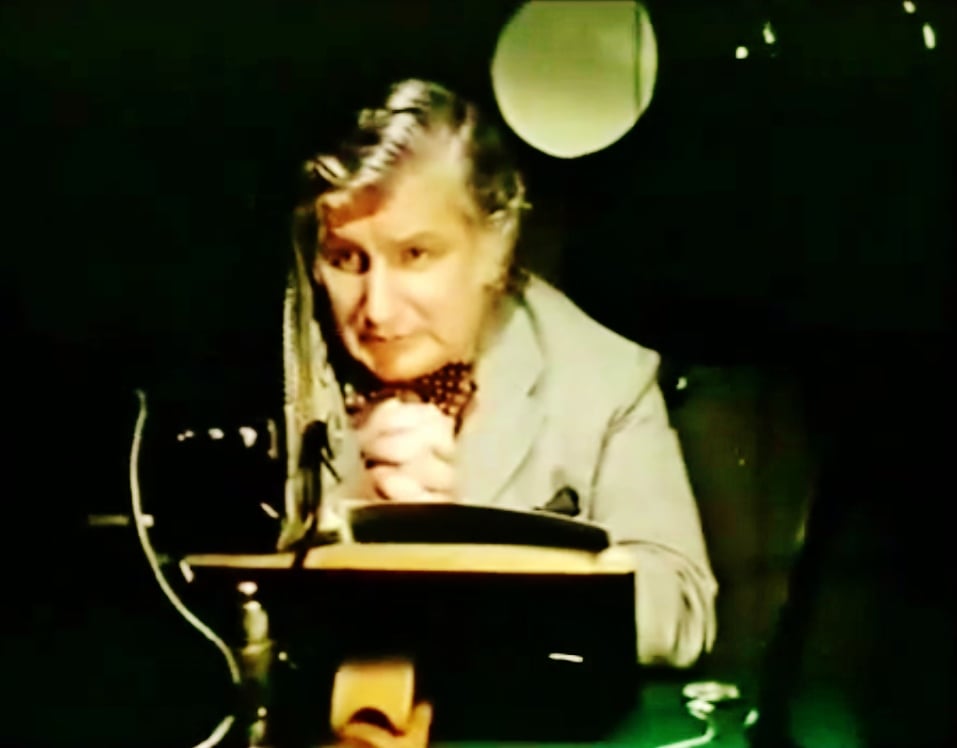
Macreadie is a most theatrical man, flourishing his glass of post-show sherry, luxuriating in his own drama like a turkey basting itself in gravy. The word “narcissist” is not used, but much is made of his self-satisfaction, his assurance that every British ear is at his beck, that the forces of narrative and the night itself are his to orchestrate. His is always the last feature of the broadcast day; “after him,” says the narrator, glancing at Rimbaud, “came silence and darkness.”
Two technicians monitor Macreadie’s broadcasts from a darkened booth; he sketches for them the premise of his next tale. It will involve a magician who takes a young boy as his stage assistant, but is frustrated by the boy’s fearful refusal to play along with a specific illusion: the disappearing box. The magician tricks the boy into the box in the midst of a show — then can’t get it open. The audience is frantic; a blacksmith is called. By the time the box is opened, the boy is dead, having asphyxiated from an onrush of pure fright.
“Wonderful,” says a technician. “The box is possessed.”
But the story isn’t finished. The magician begins to hear a child’s voice crying out in the night, begging to be released from the box. He is haunted and hounded by this “poignant treble” which clearly seeks to drive him to madness.
That’s all Macreadie has, for the moment. “I’ll work up a chilling climax,” he says, toasting himself with sherry.
After reading the first part of the story on the air, he’s walking down an alley. He stops, turns, and looks back. But he’s alone.
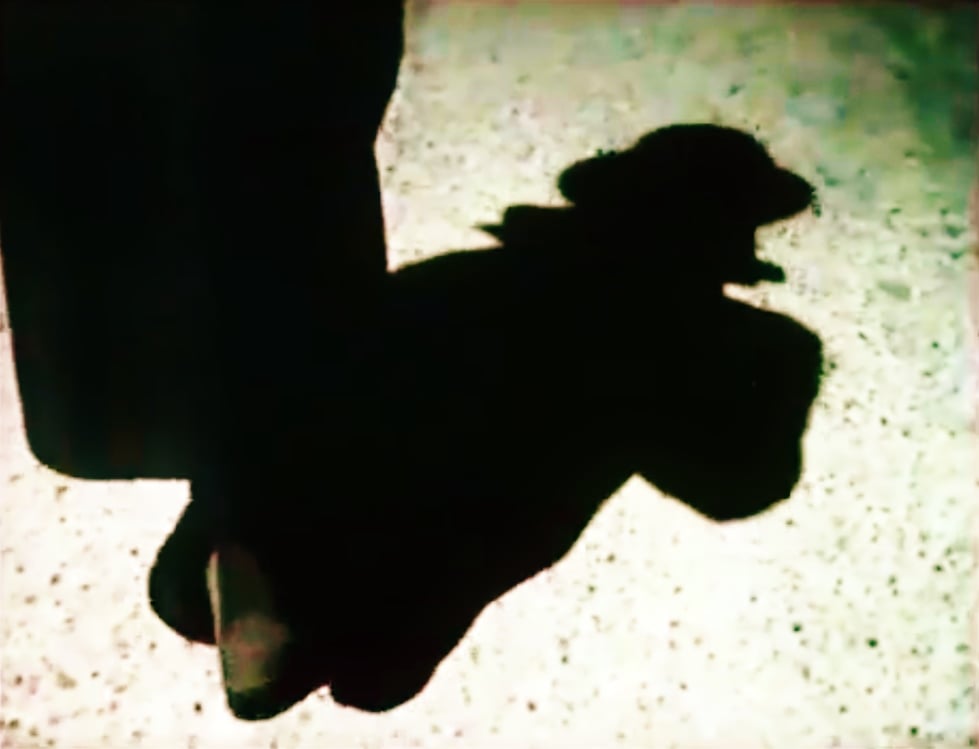
Later, at home, he writes and rehearses the story’s second installment. He’s pleased with it, though he still feels disturbed — accompanied, somehow. But he looks in the mirror and says, “Nothing to be afraid of, dear boy. You can always talk to yourself if the silence becomes unbearable.”
The hour is late and Macreadie is in bed when he hears the tinny rattle of the telephone. He goes to the parlor to answer it.
“Is that Mr. McCready? … The story you are reading …”
“What of it, little boy? You are a little boy… ?”
“I would prefer you go no further with it.”
“No further? Why not indeed?”
“It troubles me a great deal.”
It’s an odd voice, less terrifying than inexplicable. It sounds mechanically altered, as if mutated from vocal cords and telephone cords. It isn’t a child’s voice, not really; more like an adult imitating a child’s despair in a Boris Karloff drone, the result artificially twisted and heightened for pitch.
“This is preposterous. Who are you? Is this some kind of prank disturbing my sleep?”
“Oh — I didn’t think you were asleep.”
“Most certainly.”
“You sound most attentive and alert.”
“What’s that? You’re not a little boy. Who are you?”
The connection is terminated.
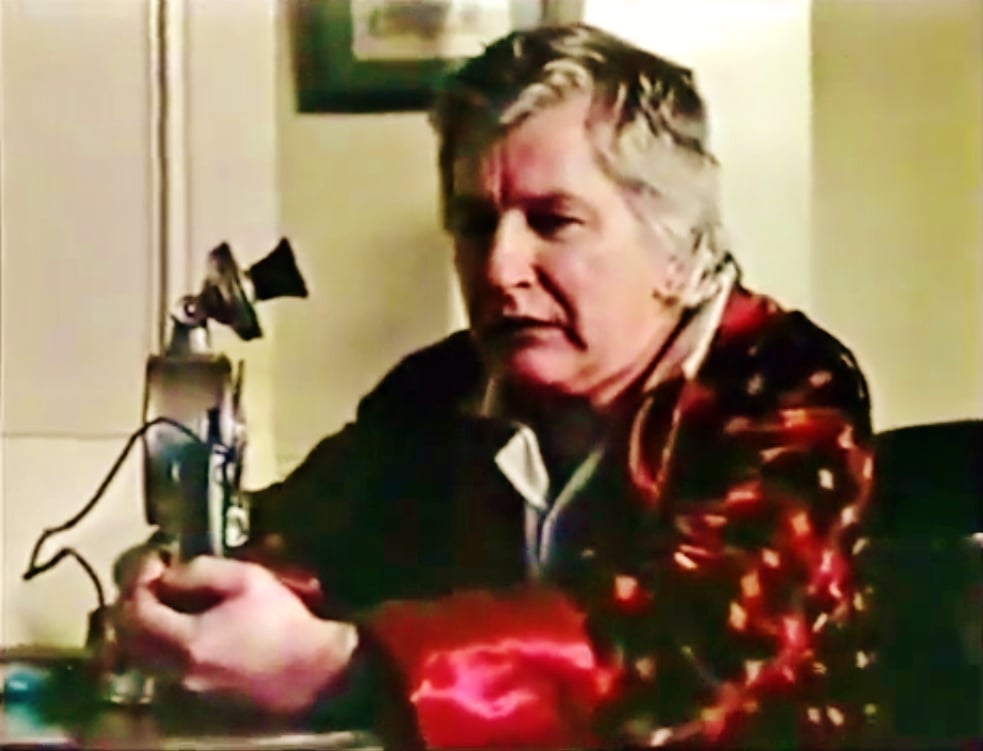
Shaken, Macreadie nevertheless goes on the air to narrate the story’s second part. But he gets his own name wrong; he stammers and gives a ragged, anguished reading. “I was a wreck tonight,” he complains to the technician who brings his sherry. “I couldn’t get a sentence out without shaking and shuddering…. I felt as if I was being smothered.” He’s certain the switchboard must have blazed with calls of complaint.
Yet the technician assures him there wasn’t a single call — that the star’s reading was typically flawless, and in fact the whole broadcast went “smooth as silk.” Evidently the anguish was in Macreadie’s imagining, and in ours.
He finishes the story’s final part at home, pacing as he places each intonation. Before retiring, he takes the telephone receiver off its hook. He retreats to his room, and the camera comes in close on the mouthpiece. We hear the child’s faint voice. It trills an eerie lullaby:
And so the poor stone was left all alone, fa la la la la de…
Suddenly, the bedside clock telling two, Macreadie rises from his sleep, roused by the singing. He creeps to the phone as the voice trills on:
There were two birds sat on a stone, fa la la la la de
One flew away and then there was one, fa la la la la la la de
The other flew up and then there was none
And so —
The lullaby is of unknown authorship, but probably shares origins with “Three Ravens,” aka “Twa Corbies,” a grisly ballad dating from the seventeenth century; it was collected in 1828 by Sir Walter Scott and used by Charles Kingsley in his famous children’s fantasy novel The Water Babies (1863).
Macreadie picks up the receiver and hears:
“I would so much prefer you not to finish this story, sir.”
Still, Macreadie goes through with it.
Or tries. He is on the air, about to culminate the third installment and thus the story, when a fuse blows in the studio. The technicians’ faces disappear in darkness; soon even their voices are gone. Macreadie is alone. And then the child’s voice echoes in the room: it’s coming through the microphone.
“Mr. Macreee-deeee. Mr. Macreee-deeee … I asked you to stop. Why didn’t you listen to me?”
The child’s voice again sings the bird rhyme. Macreadie bangs on the door, which has somehow become locked, then collapses on the tabletop, vacant eyes staring at his stack of story pages. There he is found by the technicians, who are unable to understand why Macreadie locked himself in.
The incident, the narrator tells us, “created a stir at the time — because the story was never finished.” We see Macreadie in the aftermath, shuttered in his dark apartment, unable to pour his sherry for shaking. He never regains his nerves, his confidence, or his vocal command; he’s left a pale and palsied wreck. And we are left, like his radio audience, with an unfinished story, an unresolved mystery.
A Child’s Voice, sad to say given such makings, is not terribly scary. The atmosphere, much like the voice that comes through the telephone speaker, is both tendentious and tinny, with all atmospherics in place yet with some soul or essence quite missing. But the little play is key to our consideration of phone horror as genre, theme, and thematic, chiefly for its employment of the telephone as the radio’s dark enforcer. It offers the two most important mass-communications breakthroughs of the late nineteenth century as evil allies in the electronicized twentieth, each enabling absolute intimacy but leading to absolute isolation. (“And the people most affected by it were those who lived and listened alone”; “And so the poor stone was left alone.”)
David Thomson, like any writer worth following over the course of a career, has themes that can be retrieved from the crossed paths of divergent explorations. Among them is the projection of personal power and romantic illusion from within an essential emptiness, a human void — one reason he is drawn to not only such elusive showmen as Orson Welles and Warren Beatty but to Hollywood itself, and to kindred subjects like Howard Hughes and Las Vegas. He is fascinated by the ability of a certain kind of power to influence, inspire, or terrify, to multiply force around a physical absence.
At the opening of his dual biography-novel Warren Beatty and Desert Eyes (1987), Thomson relates a bit of anecdote about his mysterioso subject: “He likes to telephone women in the night and ask, ‘What are you wearing? Let me guess.’ And so later they wonder if it is them he likes or simply the phone’s authority.” Rosebud, Thomson’s 1995 biography of Welles, revels in detail and description of Welles’s Mercury Theater of the Air, the radio troupe whose 1938 War of the Worlds broadcast innocently hoaxed a good part of the American northeast; elsewhere, he recalls hearing Welles play his Third Man villain, Harry Lime, on a short-lived 1950s radio series. “I still believe that radio is a matchless medium, sadly neglected in America,” he writes in his childhood memoir, Try to Tell the Story (2009). “This is the story of a lucky boy — lucky to be raised in the age of radio.”
It makes sense that Thomson would, not thoughtlessly but along the way, accord the telephone a similar, aligned power. In the Beatty book he speaks of “the transcendent intuitive power of the telephone” as purveyor of glamour, sexuality, and clout (Beatty the compulsive seducer who would just as soon not be touched, or even seen; Hughes the paranoid controlling the tentacles of his empire by long-distance line and intercom), and of the phone as “the instrument of intimacy for those who may not want actually to be with each other.” Clearly the radio’s first hook and demonstrated power — that of a disembodied voice to capture the imagination — entered Thomson early; and perhaps radio played the role for his younger self that the telephone played for mine — carrier of that voice and its exciting, sinister potential, a line to some unseen but contingent reality that tingled with the unknown yet was, in the end, perfectly safe: all that earthly and unearthly possibility, after all, runs through a mere wire that leads to a mere box that is plugged into a mere wall.
Safe they may seem, that homely old radio of stained walnut, that hallway phone of indestructible Bakelite. Yet much of the power of narrative — or of “story,” as Thomson often calls it, sans article — is its ability, drawing on our desire as hearers, to render the safe unsafe, the obvious strange. To send otherworldly signals coursing through those wires; to make us wonder what is behind the wall; to open the closed box and reveal its dead body, release its haunted voice. That is the promise and danger of story; it is what we ask for, and what we pay for, each time we invest in a novel, immerse in a movie, trust in a myth, or tell a lie.
This observation is inherent in the text of A Child’s Voice, though fumbled in the execution. Macreadie, with his narcissism and sherry — his superiority to the promise and danger that seemed, for a time, his to control — underestimates the ability of story to escape its bounds, and of desire to take on a life of its own. We are left to imagine or invent the exact nature of those bounds, that desire, because A Child’s Voice, like Macreadie’s last radio tale, remains unresolved. What we have seen, though, and clearly, is Thomson’s prognosis of dire possibility in the ancient practice of storytelling when it meets modern technology. A kind of horrible spell is being sent out through these machines; black magic is conjured in their confluence.
Radio, with an audience of millions, broadcasts the invocation. The telephone, with an audience of one, delivers the curse.
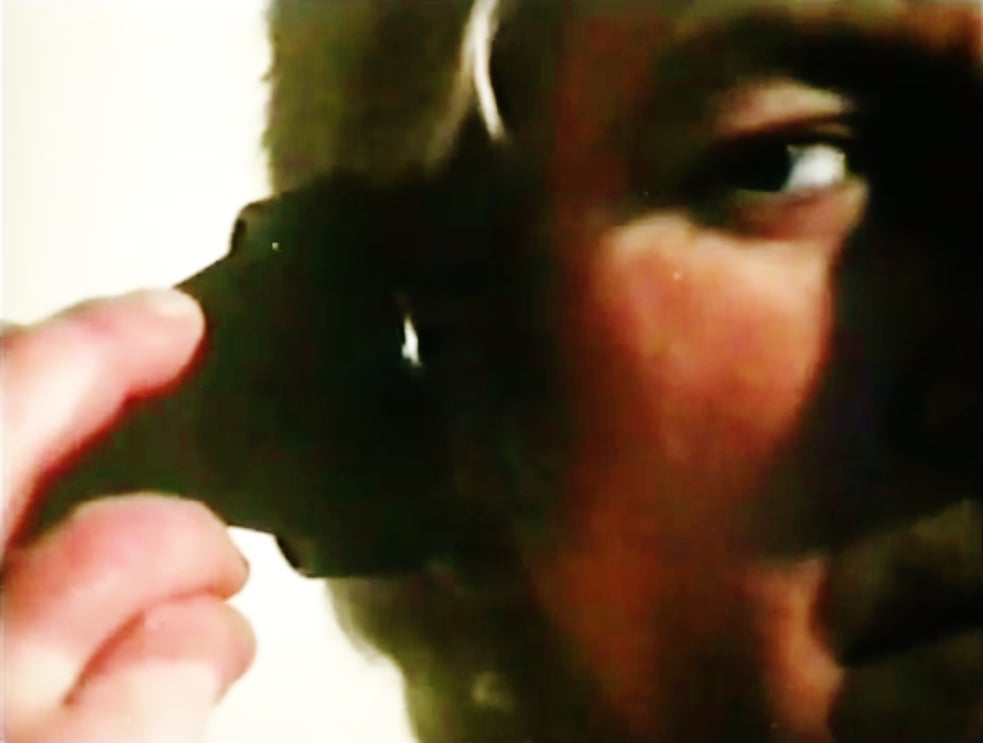
***
MORE HORROR ON HILOBROW: Early ’60s Horror, a series by David Smay | Phone Horror, a series by Devin McKinney | Philip Stone’s Hat-Trick | Shocking Blocking: Candyman | Shocking Blocking: A Bucket of Blood | Kenneth Anger | Sax Rohmer | August Derleth | Edgar Ulmer | Vincent Price | Max von Sydow | Lon Chaney Sr. | James Whale | Wes Craven | Roman Polanski | Ed Wood | John Carpenter | George A. Romero | David Cronenberg | Roger Corman | Georges Franju | Shirley Jackson | Jacques Tourneur | Ray Bradbury | Edgar Allan Poe | Algernon Blackwood | H.P. Lovecraft | Clark Ashton Smith | Gaston Leroux |

